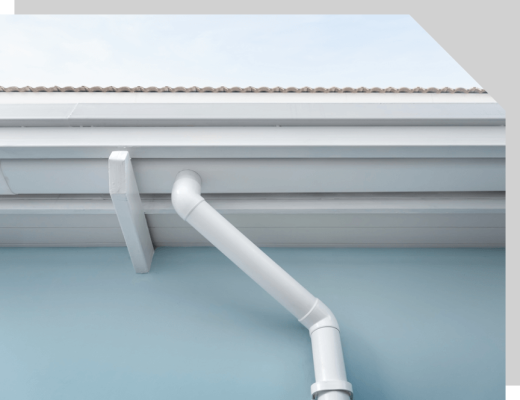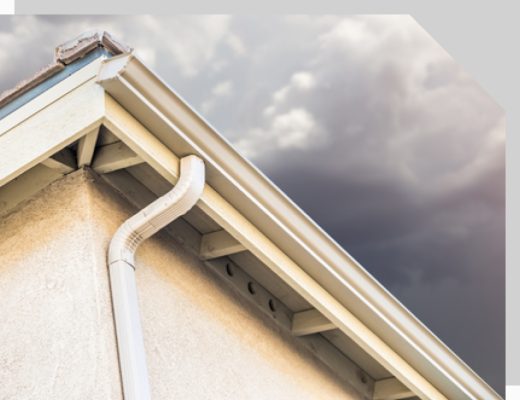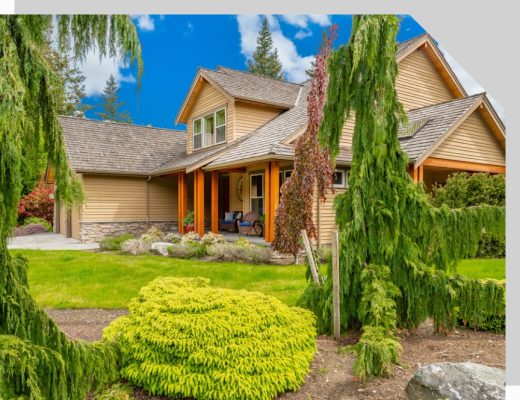Your Guide to Types of Rain Gutters: Choose the Best for Your Home
Gutters are an essential component of any building’s roofing system, responsible for channeling rainwater away from the structure to prevent water damage. There are various types of gutters available, each with unique features, materials, and installation methods
At Thunder Bay Roofing, our expert Maryland contractors offer various gutter services when you need them! To get your free estimate, contact our professionals today by calling 410-956-7663.

Types of Gutters
Standard Gutters
Standard gutters, or K-style gutters, are most commonly installed on residential homes. They’re named K-style gutters because of their profile, which resembles the letter K when viewed from the side. These gutters are available in various sizes and materials, including aluminum, copper, and galvanized steel. They can be painted to match the color of your home’s exterior, making them a popular choice for homeowners who want a seamless look.
Seamless Gutters
Seamless gutters are becoming increasingly popular due to their sleek appearance and low maintenance. They’re made from a single piece of material, eliminating the need for seams that can leak or become clogged with debris. Seamless gutters are custom-made on-site to fit your home’s exact dimensions, ensuring a perfect fit and minimal maintenance. They can be made with various materials, such as aluminum gutters and copper gutters.
Sectional Gutters
Sectional gutters are a popular type of rain gutter found in residential and commercial buildings. These gutters are made up of multiple sections connected to form a continuous gutter system. Sectional types are available in a variety of materials, including vinyl, aluminum, and steel gutters. They’re easy to install and can be a cost-effective option for homeowners.
Half-Round Gutters
Half-round gutters are a classic and elegant option that adds a touch of sophistication to your home’s exterior. These gutters have a rounded shape that resembles a half-circle, giving them a unique and timeless look. They’re typically made of copper or aluminum and are available in various sizes and colors. However, half-round gutters are less efficient at handling heavy rain and may require more frequent cleaning than other gutter types.

Box Gutters
Box style gutters are a popular choice for commercial buildings, but can also be installed on residential homes. These gutters are built into the roofline and are designed to be hidden from view, giving them a clean and modern look. Box gutters are available in various materials, including aluminum and steel, and can be customized to fit your home’s exact dimensions. However, box style gutters require regular maintenance to prevent leaks and blockages.
European Gutters
European gutters, or bead gutters, are a type of gutter popular in Europe and other parts of the world. They’re made of copper or zinc and have a distinctive bead-like shape. European gutters are designed to be installed without visible hangers or brackets, giving them a more seamless look. However, they can be more expensive than other types of gutters and may require professional installation.
Fascia Gutters
Fascia gutters are installed directly onto the fascia board, which is the board that runs along the eaves of a roof. This gutter style is ideal for homes with little or no overhang, as it provides extra support for the roofline. They can be made with various materials, such as aluminum, copper, or vinyl gutters.
Custom Gutters
Custom gutters are specially designed to fit the unique architectural features of your home or building. Their size, shape, and material can be customized to ensure they’re a perfect match for your property. With custom gutters, you can enhance the visual appeal of your home or building while ensuring proper water drainage and protection against water damage. Custom gutters are a great option for those who want to add a personal touch to their property and ensure that their gutters are functional and aesthetically pleasing.
Gutter Materials
The most common gutter materials include:
- Aluminum: The most popular and affordable option. Aluminum gutters are lightweight, rust-resistant, and come in various colors. They can be seamless (custom-made on-site) or sectional (pre-cut lengths).
- Vinyl: Another budget-friendly option, vinyl gutters are lightweight, easy to install (DIY-friendly) and require minimal maintenance. However, they may not be as durable as aluminum and can become brittle in extreme weather conditions.
- Galvanized steel: More durable than aluminum, galvanized steel gutters are strong and can withstand heavy rain and snow. However, they’re heavier, more prone to rust, and require professional installation due to soldering needs.
- Zinc: A low-maintenance option, zinc gutters develop a natural patina over time, enhancing their aesthetic appeal. They’re durable and resist rust but they can be expensive.
- Copper: Offering a classic and elegant look, copper gutters are highly durable and can last for over a century. However, they’re the most expensive option and require professional gutter installation.
Matching Gutter Types with Different Roof Materials and Designs
Matching the right gutter type with your roof material and design is important to ensure proper water drainage and to maintain the aesthetic appeal of your home’s exterior. Here are some tips to help you choose the right gutter type for your roof:
- Consider the Pitch of Your Roof: The pitch of your roof can impact the type of gutter and gutter material you need. A steeply pitched roof may require a larger gutter size to handle the volume of water runoff, while a flat roof may need a different type of gutter altogether.
- Look at the Roof Material: Different types of roofs, such as asphalt shingles, metal, or tile, may require different gutters. For example, metal roofs may benefit from a seamless gutter system, while tile roofs may require custom gutter designs to accommodate the unique shape and slope of the tiles.
- Architectural Style of Your Home: Your home’s architectural style can also impact the type of gutter you choose. For example, a traditional or historic home may benefit from half-round gutters, while a contemporary home may look better with a box style gutter system.
- Look at the Color and Finish of the Gutters: The color and finish of your gutters should complement your roof and home’s exterior. Choosing the right color and finish can help enhance the overall aesthetic appeal of your home.

Frequently Asked Questions
To determine the right size gutter for your home, you’ll need to consider several factors, including the size of your roof, the amount of rainfall in your area, and the slope of your roof. Generally, larger roofs and areas with higher amounts of rainfall will require larger gutters to handle the water flow. A professional can help you determine the right size of gutters for your home based on these factors.
Fascia gutters are typically installed on sloped roofs with fascia boards that run horizontally along the roofline. They may not be suitable for roofs with other types of framing, such as exposed rafter tails or parapets.
Yes, box style gutters can be customized to match the style of your building, including the material and finish. They can be made of various materials, including copper, aluminum, and steel, and can be finished in many colors.
K-style gutters are named for their resemblance to the letter “K” when viewed from the side. They feature a flat bottom with vertical walls at the front and back. This design offers several advantages over other gutter styles, such as half-round gutters.
